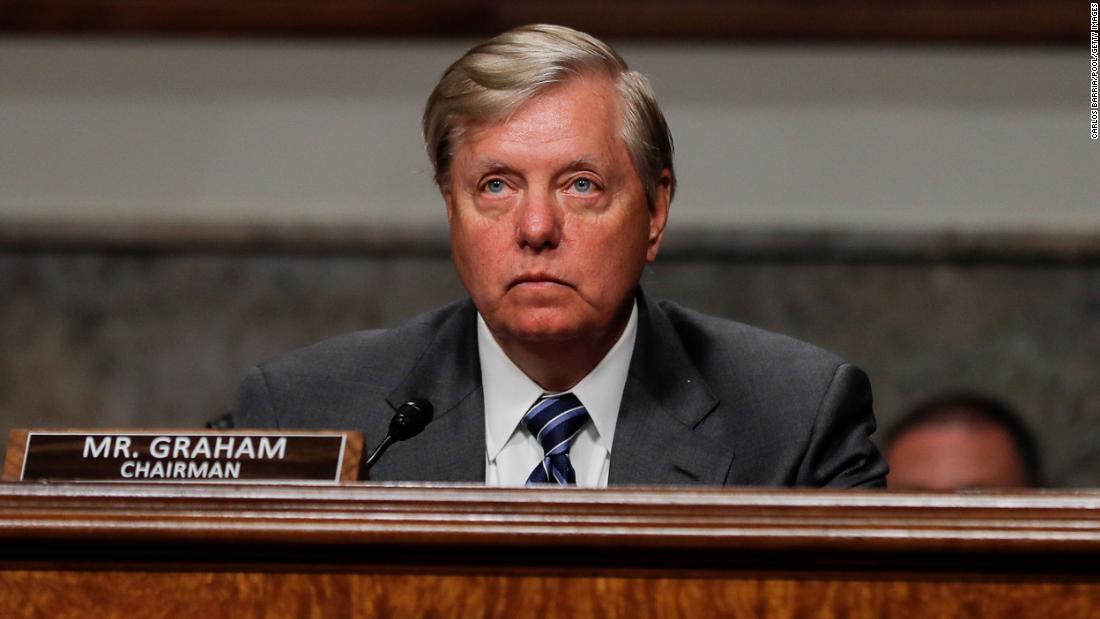Lindsey Graham and Senate GOP members say they will not support the sweeping $3 trillion Covid-19 stimulus bill from House Democrats
The legislation, which allocates more funding for state and local governments, coronavirus testing, and a new round of direct payments to Americans, sets up an immediate clash with the Republican-controlled Senate, where leaders have said another round of emergency funding is not yet needed.
Democrats released the 1,815-page legislative text of the bill Tuesday afternoon and House Speaker Nancy Pelosi spoke from the US Capitol after its introduction.
Pelosi took aim at congressional Republicans who have argued that it would be better to first evaluate how already-enacted aid is implemented before moving ahead with another relief bill.
“For the families who are suffering though, hunger doesn’t take a pause, rent doesn’t take a pause, bills don’t take a pause, the hardship of losing a job or tragically losing a loved one doesn’t take a pause,” Pelosi said, describing the crisis as “a historic challenge” and “momentous opportunity for us to meet the needs of the American people, to save their lives, their livelihoods and our democracy.”
But Senate Republican leaders warned Pelosi that the new bill is dead on arrival even before it was formally unveiled.
“That will not pass. It’s not going to be supported,” said Sen. John Barrasso, a member of Republican leadership in the chamber.
House Majority Leader Steny Hoyer, a Maryland Democrat, said in a notice to members Tuesday afternoon that the House is expected to meet Friday morning to vote on the legislation.
The package is expected to cost more than $3 trillion, according to a senior House Democratic aide. Three other aides also told CNN the price tag would be in the $3 trillion range. That would dwarf the stimulus measure enacted in March, which was more than $2 trillion and at the time amounted to the largest emergency aid package in American history.
House Democrats have pressed ahead with a new stimulus package amid stiff resistance from Republican lawmakers and the White House, who say they want to wait to see the impact of previously enacted relief measures before moving forward with any new package.
Without some Republican support, the House bill cannot pass in the Senate. But unveiling legislation now gives Democrats an opportunity to showcase their priorities and outline their legislative vision for how to help a country in dire straits as a result of the devastating pandemic.
Republican Sen. John Cornyn reiterated Tuesday that he believes there is no “urgency” on passing another coronavirus relief bill when asked if the Senate will likely wait until after Memorial Day recess to take up phase four legislation.
“I don’t think there’s a sense of urgency to do it now because a lot of the money we’ve already appropriated hasn’t been even gone out the door yet,” the Texas Republican told reporters. “So, we’re taking one day at a time.”
Republican Sen. Lindsey Graham said the bill is “dead on arrival” in the Senate.
On phase four, Graham also said “Oh, God, no, no way” about whether the Senate will pass another coronavirus relief bill before the Memorial Day recess. But he added he’s “sympathetic” to the idea that the economy will need additional help to recover.
But there are a number of potential significant sticking points to any bipartisan agreement on another round of emergency funding.
Senate Republicans have argued that liability reforms to protect employers from a rash of lawsuits would need to be included in any upcoming legislation, a demand Democrats have balked at.
“Our focus has been on protecting people, not protecting people from hurting them and having no liability for hurting them,” he said.
Democratic leaders are also planning move forward with a remote voting and remote committee work plan on Friday, Hoyer said.
He said he is disappointed Democrats and Republicans have not reached an agreement on proxy voting, although party leaders continue to work for a deal.
“I am hopeful that we will get there, but we absolutely need to get there and we need to get there quickly,” he said. He reiterated that if there is no agreement, Democrats will proceed with their own plan.
This story has been updated to include additional information and reaction.
CNN’s Ali Zaslav, Lauren Fox and Ted Barrett contributed to this report.
![]()


